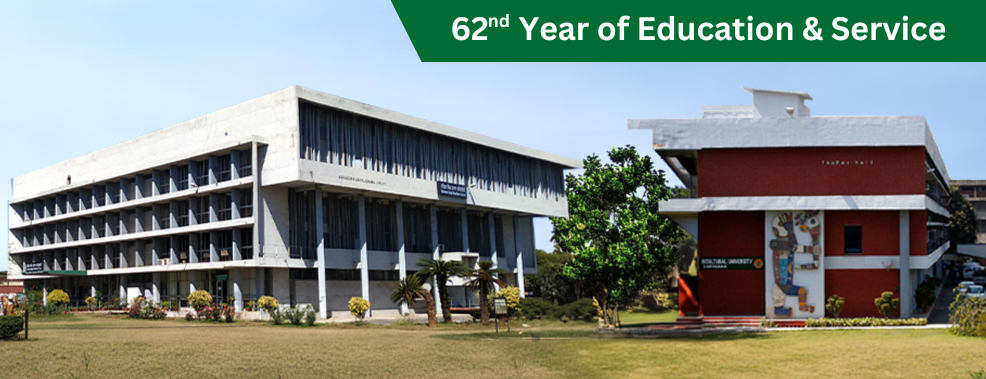62nd Year of Education & Service
College of Agriculture / Plant Pathology / Faculty
Name : |
Dr Manmohan Dhkal |
Designation : |
Plant Pathologist |
Office Phone : |
0161-2401960 Ext. 319 |
Mobile : |
7986860330 |
Email (Office) : |
manmohan90@pau.edu |
Research Areas : |
-- |
Researcher ID's : |
-- |

College of Agriculture / Plant Pathology / Home
The Plant Pathology Section came into existence as a full-fledged unit in 1929 at the Punjab Agricultural College and Research Institute, Lyallpur. As the Punjab Agricultural University came into being in October 1962,when the Plant Pathology Section was constituted as one of the Department of the College of Agriculture. It was under the charge of Late Pandit Chetan Sarup Paracer. During 1964-65, the section of Botany was merged into the Department of Plant Pathology, with the appointment of Dr Suryanaryan at the Hisar Campus to head it. Present set up of the Department of Plant Pathology came into existence during 1972.
College of Agriculture / Plant Pathology / Head of Department

Name : Dr. Prabhjodh Singh Sandhu
Address : Head, Department of Plant Pathology
Office : 0161-2401960, Ext-322
E-Mail : hodpp@pau.edu
Brief Introduction
Born on 5th May 1969 in the village Shankarpura of District Gurdaspur, Dr Prabhjodh Singh Sandhu completed his M.Sc. (Plant Pathology) in the year 1994. Dr Sandhu joined PAU in February 1996 as Assistant Professor of Plant Protection at KVK, Kapurthala. He completed his Ph.D. in Plant Pathology in the year 2005 and joined Oilseed research group in the Department of Plant Breeding and Genetics.
Dr Sandhu has extensive experience in plant pathology research, extension, and education. He is currently managing 4 research projects and has completed 7 ad hoc research projects funded by various national and international funding agencies, including DST, DBT, ICAR, and BBSRC UK. He has identified the first source of resistance to the deadly Sclerotinia rot of rapeseed-mustard disease and has played a key role in phenotyping Brassica juncea introgression lines bearing genomic introgression from wild species. He has been involved in the release of white rust resistant canola mustard variety RLC3 and hybrid RCH1. o sources of white rust resistance have been registered with the Indian Council of Agricultural Research's Plant Germplasm Registration Committee (PGRC). Also, he has discovered Diplotaxis erucoides as a source of resistance to the pathogen Alternaria blight, which had no known sources of resistance up until this point. Also, Dr. Sandhu was involved in the evaluation and release of 18 different oilseed crop types, including sesame, groundnut, and rapeseed-mustard. He has developed 21 disease management technologies for various oilseed crops. Since 2005, Dr Sandhu has worked in a multidisciplinary team with strong collaborations with scientists in India and abroad. His research team was awarded ICAR-Best AICRP Centre Award for the year 2011-12 by ICAR-Directorate of Rapeseed Mustard Research.
Dr Sandhu has 61 research publications to his credit in journals of national and international repute and 76 other research publications including abstracts, book chapters and bulletins besides 68 extension articles. He has delivered 41 TV/radio talks besides 115 lectures in various training progammes. He has guided 8 M.Sc. and 3 Ph.D. students. Dr Sandhu is the recipient of Australian Government’s Prestigious Endeavour Research Fellowship (Australia Awards) and worked at the University of Western Australia Perth in 2009. He is a widely travelled scientist and has presented his research work in various conferences at Germany, Canada, China, Czech Republic and France. He is a Fellow of the Society for Rapeseed-Mustard Research in Bharatpur and the Indian Society of Oilseeds Research in Hyderabad. Besides research, teaching and extension, Dr Sandhu has also served the University as Security Officer for eight years. Currently he is also the President, Sports Committee of College of Agriculture, PAU, Ludhiana.
College of Agriculture / Plant Pathology / Thrust Areas
- Monitoring of plant diseases for new virulences of pathogens
- Biology and epidemiology of important plant diseases caused by fungi, bacteria, viruses and nematodes
- Rational and need-based use of fungicides for management of plant diseases for economic management of plant diseases
- Molecular diagnosis and variability of plant pathogens
- Bio control of soil-borne plant pathogens
- Mapping of disease free areas in the state
College of Agriculture / Plant Pathology / Faculty
Faculty
College of Agriculture / Plant Pathology / Faculty Distinctions
| NAME OF THE AWARD | NAME OF THE SCIENTIST(S) | YEAR |
| PROF. M.J. NARASIMAHAN MERITACAMEDIC AWARD |
DR. J.S. JHOOTY | 1972 |
| DR B.L. CHOPRA | 1972 | |
| DR. H.L.KHATRI | 1974 | |
| DR. C.D. MAYEE | 1974 | |
| DR. N.K. SHARMA | 1979 | |
| DR S.S. BAINS | 1979 | |
| DR. R.S. SINGH | 1980 | |
| DR. S.S. CHAHAL | 1982 | |
| ICAR TEAM AWARD | DR. S.S. AUJLA | 1980 |
| DR. Y.R.SHARMA | 1980 | |
| DR. A.S. GREWAL | 1980 | |
| DR H.S. REWAL | 1983 | |
| DR. S.S. CHAHAL | 1986 | |
| DR. (MS) SUMAN BALA | 1986 | |
| FRENCH GOVERNMENT FELLOWSHIP FOR POST-DOCTORAL RESEARCH | DR.T.S.THIND | 1985 |
| PESTICIDE INDIA AWARD | DR. S.S. BAINS | 1988 |
| DR. S.S. CHAHAL | 1990 | |
| DR.T.S.THIND | 1990,1995 | |
| DR S.B.SHARMA | 1990 | |
| DR. S.S. SOKHI | 1990 | |
| DR. INDU SHARMA | 1993 | |
| DR. S.S. AUJLA | 1993 | |
| DR CHANDER MOHAN | 1995 | |
| LE GRAND COUNSEIL BORDEAUX MEDAL | DR.T.S.THIND | 1992 |
| PUNJAB STATE COUNCIL OF SCIENCE AND TECHNOLOGY APPRECIATION AWARD | DR.T.S.THIND | 1994 |
| POST-DOCTORAL FELLOWSHIP AT INTERNATIONAL RICE RESEARCH INSTITUTE, MANILA, THE PHILIPPINES | DR NARPINDERJEET KAUR DHILLON | 1994 |
| AICRP (FRUITS) APPRECIATION AWARD |
DR S.P. KAPUR | 1995 |
| AV HUMBOLDT FELLOWSHIP GERMANY | DR J.S. BEDI | 1996 |
| KOSEF AWARD SOUTH KOREA | DR. P.P.SINGH | 1996 |
| PAU MERITORIUS TEACHER AWARD | DR. S.S. CHAHAL | 1998 |
| DR. HARBHAJAN SINGH MEMORIAL GOLD MEDAL |
DR P.P.SINGH,DR S.S. SOKHI | 2000 |
| B.B. MUNDKAR MEMORIAL AWARD | DR S.S. CHAHAL | 2000 |
| FULBRIGHT FELLOWSHIP, UC DAVIS, USA | DR. T.S. THIND | 2001 |
| DAAD FELLOWSHIP, GERMANY | DR. JASPAL KAUR | 2002 |
| DR. NARINDER SINGH | 2004 | |
| PROF. M.J. NARASIMAHAN COMMENDATIN MEDAL |
DR. T.S. THIND; DR CHANDER MOHAN | 2003 |
| SMT. SATWANT KAUR MEMORIAL BEST EXTENSION AWARD |
DR. H.S. REWAL | 2005 |
| M.S. PAVGI MEMORIAL AWARD | DR. T.S. THIND | 2007 |
| P.P.SINGHAL MEMORIAL PESTICIDE INDIA WARD | DR. T.S. THIND | 2009 |
| BEST RESEARCHERS AWARD | DR. T.S. THIND | 2009 |
| DR.G.S. KHUSH DISTINGHISHED PROFESSOR AWARD | DR. T.S. THIND | 2010 |
| BEST RESEARCHER AWARD | DR. NARINDER SINGH | 2010 |
| PROF. MANJEET SINGH CHINNAN DISTINGUISHED PROFESSOR AWARD | DR. PUSHPINDERPAL SINGH PANNU | 2015 |
| YL NENE OUTSTANDING PLANT PATHOLOGY TEACHER AWARD 2016 | DR T. S. THIND | 2016 |
| HONORARY FELLOW OF PUNJAB ACADEMY OF SCIENCES | DR T. S. THIND | 2017 |
| HPS LIFETIME ACHIEVEMENT AWARD | DR T. S. THIND | 2017 |
| IPS RECOGNITION AWARD | DR T. S. THIND | 2018 |
College of Agriculture / Plant Pathology / Important Achievements
SALIENT ACHIEVEMENTS DURING THE LAST FIVE YEARS-
- The Department of Plant Pathology decoded the mystery of dwarfing in rice during kharif 2022. Southern Rice Black Streaked Dwarf Virus was identified to be associated with dwarfing phenomenon for the first time in India
- Patent granted- Electric soil disinfector has been developed to disinfect soil from soil borne fungal and nematode pathogens especially for net /poly houses
- Forewarning system for yellow rust of wheat based on weather has been developed using ‘Fundamental Approach’. This will help in timely management of disease in Punjab based on weather predictions
- Since 2015-16 wheat crop season, extensive monitoring of yellow rust of wheat conducted in collaboration with personnel from Department of Agriculture, Govt. of Punjab, lead to effective management of this diseases.
- Detached tiller culture technique developed for rapid screening for sheath blight and bacterial foot rot diseases in rice.
- Standardized Leaf Bait method for detection of Phytophthora parasitica from soil of citrus nurseries and certification of nurseries in Punjab was undertaken. Samples analysed for citrus greening using standardized molecular detection with PCR and the samples from Hoshiarpur and Abohar areas were found positive.
- Trichoderma harzianum strain was recommended to the farmers for the control of foot rot of basmati rice and for commercial production-sale licensing done with International Panaccia Ltd., New Delhi.A potent isolate of this bioagent has also been identified for managing muskmelon wilt and Phytophthora foot rot of kinnow.
- Web based decision support system developed using regression model based on weather parameters for timely management of late blight of potato in Punjab making rational use of fungicides and saved crores of rupees using less sprays.
- After extensive monitoring coupled with diagnostic work, Punjab has been established as Pest Free Area for two quarantine diseases, brown rot and ring rot of potato that would facilitate fresh potato export.
- Effective management of root knot nematode through sunhemp green manuring. Garlic inter-cropping and marigold green manuring provided effective control of root knot nematode in vegetables.
- For the integrated management of potato scab, green manuring with sunhemp or summer mungbean was recommended
- During the last five years, many new recommendations were developed for effective management of serious disease problems in wheat (yellow rust), rice (sheath blight, foot rot, false smut, rice blast), rapeseed (Alternaria blight), potato (late blight, black scurf), brinjal (root knot nematode), kinnow (foot rot, fruit drop, sooty mould) and grape (anthracnose). The disease control recommendations relied on need-based use of safe fungicides of different chemical classes, biological control and cultural practices.
College of Agriculture / Plant Pathology / Current Projects
| Sr. No. | Type of project | Name of Research Project | Duration | Sponsoring agency | Scientists involved |
| 1 | Competitive | Towards the development of monitoring and forewarning system for late blight disease of potato by integrating Epidemiological, Proximal and remotely sensed data | 2020-ongoing | DST, New Delhi | Dr Sandeep Jain, Dr Ritu Rani |
| 2 | Competitive | Addressing food security through nutritionally enriched improved cultivars and technologies for swasth bharat | 2017-ongoing | DST, New Delhi | Dr P.P.S. Pannu, Dr D.S. Buttar |
College of Agriculture / Plant Pathology / Important Publications
Research Papers (only >7.0 NAAS rating)-2017-22
| Year | Publications |
| 2022 |
|
| 2021 |
|
| 2020 |
|
| 2017 |
|
College of Agriculture / Plant Pathology / Academic Programs
DEPARTMENT OF PLANT PATHOLOGY PAU, LUDHIANA
Pl. Path.-512 Detection and Management of Seed Borne Pathogens
Sem. II, 2022-23 Credit Hours: 2+1
Course outlines:
History and economic importance of seed pathology in seed industry, plant quarantine and SPS under WTO. Morphology and anatomy of typical monocotyledonous and dicotyledonous infected seeds. Recent advances in detection of plant pathogens in seed and seedlings, their establishment and subsequent development. Localization and mechanisms of seed transmission in relation to seed infection and seed to plant transmission of pathogens. Seed certification and tolerance limits, types of losses caused by seed-borne diseases in true and vegetatively propagated seeds, evolutionary adaptations of crop plants to defend seed invasion by seed- borne pathogens. Epidemiological factors influencing the transmission of seed-borne diseases, forecasting of epidemics through seed-borne infection. Production of toxic metabolites affecting seed quality and its impact on human, animal and plant health, management of seed-borne pathogens/ diseases and procedure for healthy seed production. Seed health testing, methods for detecting microorganism.
Theory:
| Sr. No. | Topic | No. of lectures | Name of teacher | |
| Unit-I | ||||
| 1 | History and economic importance of seed pathology | 2 | Parminder Singh | |
| 2 | Plant quarantine and Sanitary and Phytosanitary measures under WTO | 3 | Sumit Aggarwal | |
| 3 | Morphology and anatomy of typical monocotyledonous and dicotyledonous infected seeds | 2 | Sumit Aggarwal | |
| Unit-II | ||||
| 4 | Recent advances in detection of plant pathogens in seed and seedlings, their establishment and subsequent development | 4 | Parminder Singh | |
| 5 | Localization and mechanisms of seed transmission in relation to seed infection | 2 | Sumit Aggarwal | |
| 6 | Seed to plant transmission of pathogens | 3 | Parminder Singh | |
| Unit-III | ||||
| 7 | Seed certification and tolerance limits | 2 | Parminder Singh | |
| 8 | Types of losses caused by seed-borne diseases in true and vegetatively propagated seeds | 2 | Sumit Aggarwal | |
| 9 | Evolutionary adaptations of crop plants to defend seed invasion by seed-borne pathogens | 2 | Sumit Aggarwal | |
| 10 | Epidemiological factors influencing the transmission of seed-borne diseases | 2 | Parminder Singh | |
| 11 | Forecasting of epidemics through seed-borne infection | 2 | Parminder Singh | |
| Unit-IV | ||||
| 12 | Production of toxic metabolites affecting seed quality and its impact on human, animal and plant health | 4 | Sumit Aggarwal | |
| 13 | Management of seed-borne pathogens/diseases | 2 | Parminder Singh | |
| 14 | Procedure for healthy seed production. | 2 | Sumit Aggarwal | |
Practical:
| Sr. No. | Topic | No. of Practical(s) |
| 1 | Inspection of dry seed and seed wash technique for inspection of seed borne pathogens | 1 |
| 2 | Incubation methods to study seed borne pathogens | 2 |
| 3 | Seed health testing by 2,4 D method and deep freeze method | 2 |
| 4 | Embryo count method for detection of loose smut of wheat | 2 |
| 5 | Detection of seed borne bacteria by grow on test on rolled paper towel | 1 |
| 6 | Grow on test for detection of seed borne viruses | 1 |
| 7 | Detection of seed borne viruses by DAS- ELISA assay | 2 |
| 8 | Indicator plant test for detection of seed borne viruses | 1 |
| 9 | PCR based detection of seed borne pathogens | 2 |
| 10 | LAMP assay for detection of seed borne pathogens | 1 |
| 11 | Seed inoculation techniques for pathogenicity test and host resistance studies | 2 |
| Total | 17 |
Recommended Books:
- Paul Neergaard (1977). Seed Pathology. Volume I. Diseases of fruit crops. The Macmillan Press Ltd. London P.835.
- Singh, R.S. (2018) Plant Diseases (10th edition). Oxford & IBH Pub. New Delhi, P.821.
- Ravindra Kumar and Anuja Gupta (Eds.) (2020) Seed-Borne Diseases of Agricultural Crops: Detection, Diagnosis & Management. Springer Singapore P. 871.
- D. k. Jha (1993). A Text Book on Seed Pathology. Vikas Publishing House Pvt. Ltd., India P. 132.
COURSE OUTLINE
PL PATH-517*!
DISEASES OF VEGETABLE AND SPICES CROPS
Credit Hours: 2+1
Theory
- Objective: To impart knowledge about symptoms, epidemiology of different diseases of vegetables and spices and their management.
- UNIT I: Nature, prevalence, factors affecting disease development of tuber, bulb, leafy vegetable, crucifers, cucurbits and solanaceaous vegetables. Diseases of crops under protected cultivation.
- UNIT II: Symptoms and management of diseases of different root, tuber, bulb, leafy vegetables, crucifers,cucurbits and solanaceaous vegetable crops.
- UNIT III: Symptoms, epidemiology and management of diseases of different spice crops such as black pepper,nutmeg, saffron, cumin, coriander, turmeric, fennel, fenugreek and ginger.
- Biotechnological approachesin developing disease resistant transgenics.
Practical
Detailed study of symptoms and host pathogen interaction of important diseases of vegetable and spicecrops.
Lecture Schedule: Theory
| Sr. No. | Topic | No. of Lectures |
| 1 |
Symptomatology, etiology and epidemiology of diseases ofroot, tuber, solanaceous and bulb crops |
4 |
| 2 |
Symptomatology, etiology and epidemiology of diseases of cucurbits |
3 |
| 3 |
Symptomatology, etiology and epidemiology of diseases of leafy vegetables |
2 |
| 4 |
Symptomatology, etiology and epidemiology of diseases of crucifers |
3 |
| 5 |
Diseases of crops under protected cultivation |
3 |
| 6 |
Symptomatology, etiology and epidemiology of diseases of black pepper, cumin and coriander |
3 |
| 7 |
Symptomatology, etiology and epidemiology of diseases of turmeric and ginger |
3 |
| 8 |
Symptomatology, etiology and epidemiology of diseases of fennel and fenugreek |
3 |
| 9 |
Symptomatology, etiology and epidemiology of diseases of nutmeg and saffron |
2 |
| 10 |
Biotechnological approaches in developing disease resistant transgenics |
2 |
College of Agriculture / Plant Pathology / Facilities & Services
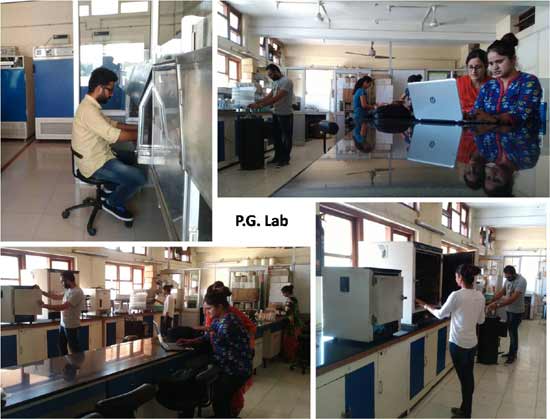 |
|
| The post graduate laboratory is equipped with all the modern facilities to aid M.Sc. and Ph.D. students to conduct their research experiments. | |
|
Plant Bacteriology Laboratory |
|
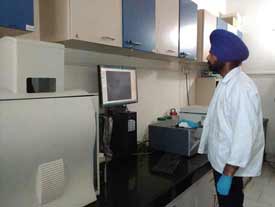 |
 |
|
The laboratory is equipped with all the facilities for basic plant pathological/microbiological work. Advanced facilities for immunological and molecular detection and characterization of Phytopathogenic bacteria are also available in the lab. |
|
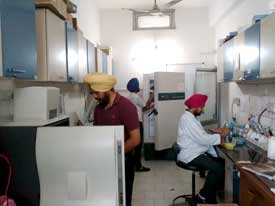 |
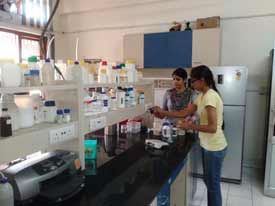 |
|
Plant Clinic |
|
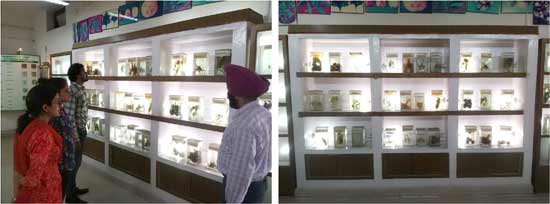 |
|
|
Students' favourite, the Plant Clinic in the department houses more than 90 well preserved diseased samples of different crop plants and serve as a quick reference for graduate and post graduate students. |
|
|
Plant Growth Chamber |
|
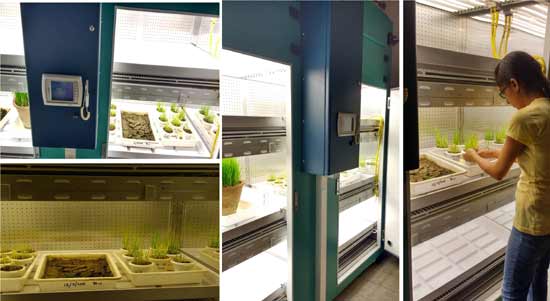 |
|
| The reach-in Conviron Model CMP-6050 has been custom designed and built to conduct research on impact of changing climate on host-pathogen interactions under simulated conditions. The CMP-6050 can be programmed to simulate temperature, light, carbon dioxide and relative humidity. | |
| Experiential Learning Program | |
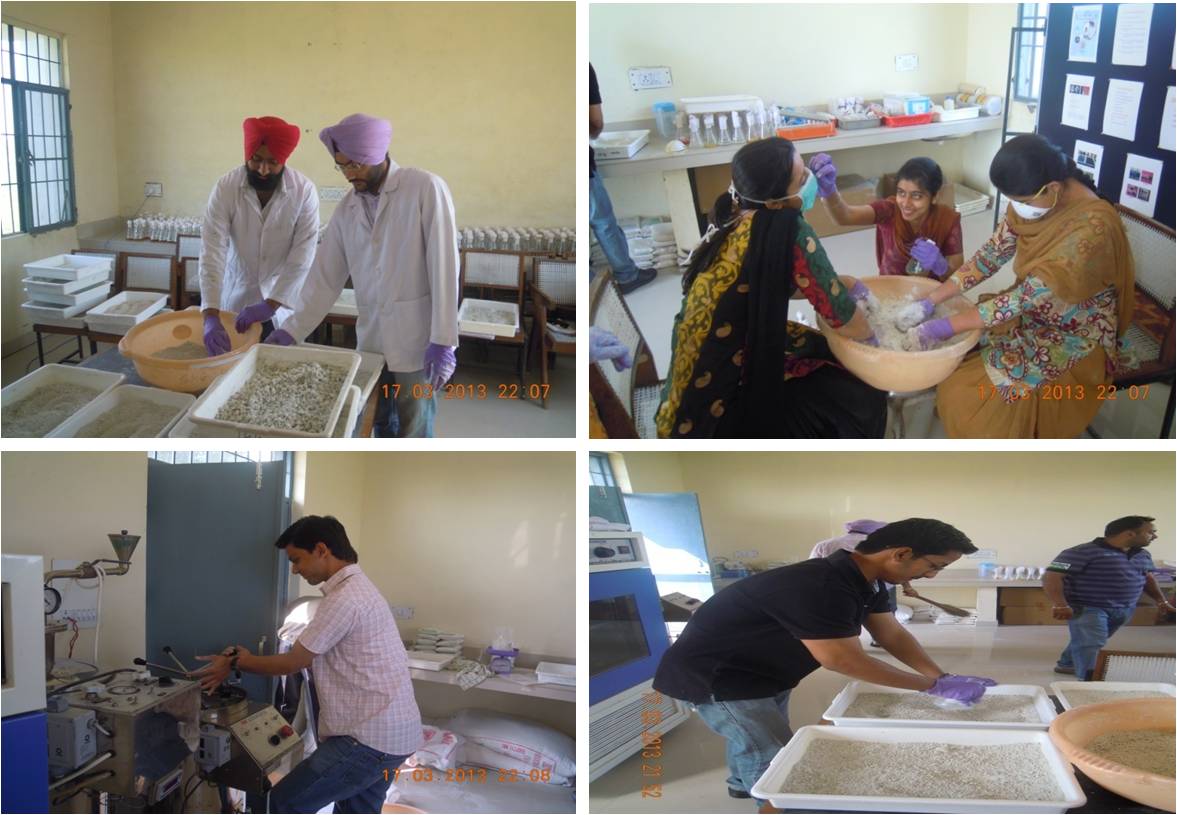 |
|
| The Department has ben successfully running Experiential learning program for B.Sc. Final year students. In this ELP, Students learn to prepare talc based formulation of biocontrol fungi Trichoderma harzianum in a dedicated laboratory facility housed in Biocontrol Lab . | |
College of Agriculture / Plant Pathology / PG Students
| M.Sc (2021 batch) | |||||
| Sr. No. | Name of the student | Admission No. | Major advisor | Title of research problem | |
| 1 | Amit Shantaram Patil | L-2021-A-104-M | Dr. Asmita Sirari | DIVERSITY OF BETASATELLITES ASSOCIATED WITH LEGUMOVIRUS(ES) AND THEIR ROLE IN DISEASE SEVERITY OF YELLOW MOSAIC DISEASE IN MUNGBEAN | |
| 2 | Bhawandeep Kaur | L-2021-A-106-M | Dr. Harleen Kaur | Association of Maize Fungal Pathogens with Seed rot and Seedling Blight and its Management | |
| 3 | Gurjot | L-2021-A-107-M | Dr. Amarjit Singh | INTEGRATED MANAGEMENT OF POD ROT OF MUNGBEAN [Vigna radiate (L.) Wilczek]. | |
| 4 | Haritha Unni | L-2021-A-108-M | Dr. Jagjeet Singh Lore | DEVELOPMENT OF TAL EFFECTOR-BASED MARKER SYSTEM FOR RACE IDENTIFICATION OF Xanthomonas oryzae pv. oryzae | |
| 5 | Megha Sharma | L-2021-A-109-M | Dr. Mandeep Singh Hunjan | DIVERSITY ANALYSIS OF Sclerotium oryzae ASSOCIATED WITH STEM ROT OF RICE | |
| 7 | Mehakdeep Singh | L-2021-A-110-M | Dr. P. P. S. Pannu | SPATIAL AND TEMPORAL DYNAMICS OF SHEATH BLIGHT IN DIRECT SEEDED RICE AND ITS MANAGEMENT | |
| 8 | Mohitpreet Kaur | L-2021-A-111-M | Dr. Jaspal Kaur | MINING OF STRIPE AND LEAF RUST RESISTANCE GENE(S) IN EUROPEAN WINTER WHEAT COLLECTION | |
| 9 | Monika Yadav | L-2021-A-112-M | Dr. P.S. Sandhu | MANAGEMENT OF SCLEROTINIA STEM ROT OF RAPESEED-MUSTARD INCITED BY Sclerotinia sclerotiorum (Lib.) de Bary | |
| 10 | Navneet Singh Sidhu | L-2021-A-113-M | Dr. Aman Sharma | INTEGRATED MANAGEMENT OF ALTERNARIA BLIGHT OF MARIGOLD (Tagetes erecta L). | |
| 11 | Ramandeep Kaur | L-2021-A-115-M | Dr. Ashlesha | INTEGRATED MANAGEMENT OF LEAF BLIGHT OF OATS INCITED BY Drechslera avenae S. Ito & Kurib. | |
| 12 | Rubleen Kaur | L-2021-A-117-M | Dr. Parminder Singh Tak | BIODIVERSITY OF SEED-BORNE PATHOGENIC MYCOFLORA OF WHEAT (Triticum aestivum L.) IN PUNJAB | |
| 13 | Shivam Singla | L-2021-A-118-M | Dr. Vineet Kumar | INTEGRATED MANAGEMENT OF FUNGAL LEAF SPOT(S) OF MUNGBEAN | |
| M.Sc (2022 batch) | |||||
| Sr. No. | Name of the student | Admission No. | Major advisor | Title of research problem | |
| 1 | Amandeep Kaur | L-2022-A-81-M | Dr. Sukhjeet Kaur | Study of inheritance for root knot nematode and pepper mottle virus in chilli Capsicum annum L (Tentative) | |
| 2 | Arpandeep Kaur | L-2022-A-82-M | Dr. Anju Bala | Yet to be decided | |
| 3 | Bhavneet Kaur | L-2022-A-83-M | Dr. Harpreet Singh | Yet to be decided | |
| 4 | Gurjot Singh | L-2022-A-84-M | Dr. Ritu Bala | Yet to be decided | |
| 5 | Harmeen Kaur | L-2022-A-85-M | Dr. Amrinder Kaur | Yet to be decided | |
| 6 | Jashanpreet Kaur | L-2022-A-86-M | Dr. Anita Arora | Yet to be decided | |
| 7 | Jaspreet Kaur | L-2022-A-87-M | Dr. Ritu Rani | Yet to be decided | |
| 8 | Muskan | L-2022-A-88-M | Dr. Pankaj Sharma | Yet to be decided | |
| 9 | Pawandeep Kaur | L-2022-A-89-M | Dr. Rupeet Gill | Yet to be decided | |
| 10 | Priyanka | L-2022-A-90-M | Dr. Jyoti Jain | Yet to be decided | |
| 11 | Rizwan Saleem | L-2022-A-91-M | Dr. Sandeep Jain | Yet to be decided | |
| 12 | Sonam Rathore | L-2022-A-92-M | Dr. Abhishek Sharma | Yet to be decided | |
| 13 | Dibya Jyoti Mahanta | L-2022-A-269-M | Dr. Manmohan Dhkal | Yet to be decided | |
| 14 | Mukesh Kumar | L-2022-A-270-M | Dr. Yesmin Kaur | Yet to be decided | |
| 15 | Parul Setia | L-2022-A-271-M | Dr. Rajnish Kumar Verma | Yet to be decided | |
| Ph.D. (2019 batch) | |||||||
| Sr. No. | Name of the student | Admission No. | Major advisor | Title of research problem | |||
| 1 | Anjali | L-2019-A-58-D | Dr. Jyoti Jain | Virulence Pattern of Leaf and Neck Blast Isolates (Pyricularia oryzae Cavara) from Basmati Rice and Identification of Resistance Donors | |||
| 2 | Harinder Singh | L-2019-A-60-D | Dr. Harleen Kaur | Characterization of mycotoxic fusarium species associated with ear rot of maize | |||
| 3 | Harneet Kaur | L-2019-A-61-D | Dr. Amarjit Singh | Specialization in Uromyces viciae-fabae and mechanism of rust resistance in lentil | |||
| 4 | Kuppuraj J | L-2019-A-62-D | Dr. Asmita Sirari | Resistance Gene Identification in Vigna Species Infected with Begomovirus | |||
| 5 | Navkiran Kaur | L-2019-A-63-D | Dr. Pankaj Sharma | Understanding sunflower-Macrophomina phaseolina interaction under water stress conditions | |||
| 6 | Rakesh Belludi | L-2019-A-64-D | Dr. Abhishek Sharma | Detection, variability and translocation of potato virus y (pvy) infecting potato in Punjab and identification of host plant resistance | |||
| Ph.D. (2020 batch) | |||||||
| Sr. No. | Name of the student | Admission No. | Major advisor | Title of research problem | |||
| 1 | Arpana Sharma | L-2020-A-61-D | Dr. Upasana rani | Race Profiling and Gene Expression Studies in Chickpea against Ascochyta blight Ascochyta rabiei (Pass.) Labr. | |||
| 2 | Divya Bhandhari | L-2020-A-62-D | Dr. Vineet Kumar | Mapping resistance genes against loose smut (Ustilago tritici) of wheat (Triticum aestivum L.) | |||
| 3 | Gutha Venkata Ramesh | L-2020-A-63-D | Dr. Jaspal Kaur | Field pathogenomics for tracking Puccinia striiformis f.sp. tritici pathotypes | |||
| 4 | Liza Kalita | L-2020-A-64-D | Dr. Sandeep Jain | Relative supression of wilt-root knot complex of cucumber using different soil disinfestation approaches and their impact on soil microbial communities | |||
| 5 | Navdeep Singh | L-2020-A-66-D | Dr. Anju Bala | Characterization of toxigenic fungi causing discoloration of rice and its management | |||
| 6 | Priyanka Negi | L-2020-A-67-D | Dr. Anita Arora | Etiology and management of guava wilt | |||
| 7 | Sukhman Kaur Aulakh | L-2020-A-69-D | Dr. Daljeet Singh | Biological control of Sclerotinia stem rot of Egyptian clover using indigenous strains of Trichoderma spp. and Bacillus spp. | |||
| Ph.D. (2021 batch) | |||||||
| Sr. No. | Name of the student | Admission No. | Major advisor | Title of research problem | |||
| 1 | Ahale Shalaka Rajesh | L-2021-A-58-D | Dr. Asmita Sirari | Diversity of emerging Begomovirus-satellite DNA complex causing yellow mosaic disease in soybean and its management | |||
| 2 | Rishab Maheshwari | L-2021-A-59-D | Dr. Jagjeet Singh Lore | Yet to be decided | |||
| 3 | Shruti Ranote | L-2021-A-60-D | Dr. Mandeep Singh | Investigating the pathogenicity determinants of the rice Bakanae fungus Fusarium fujikuroi through comparative genomics studies | |||
| 4 | Diksha Loona | L-2021-A-61-D | Dr. P.S. Sandhu | Yet to be decided | |||
| 5 | Sakshi Suchita | L-2021A-62-D | Dr. Harleen Kaur | Yet to be decided | |||
| 6 | Jasima Ali | L-2021-A-63-D | Dr. Jyoti Jain | Pathogenic potential of ear rot causing mycotoxigenic Fusarium species of maize | |||
| 7 | Harkanwal Pal Singh | L-2021-A-64-D | Dr. Sukhjeet Kaur | Yet to be decided | |||
| Ph.D. (2022 batch) | |||||||
| Sr. No. | Name of the student | Admission No. | Major advisor | Title of research problem | |||
| 1 | Sarbjit Kaur | L-2022-A-43-D | Dr. Jaspal Kaur | Yet to be decided | |||
| 2 | Ekta Gaur | L-2022-A-44-D | Dr. Abhishek Sharma | Yet to be decided | |||
| 3 | Suyasha | L-2022-A-45-D | Dr. Ritu Bala | Yet to be decided | |||
| 4 | Abhishek Sharma | L-2022-A-46-D | Dr. Upasana Rani | Yet to be decided | |||
| 5 | Rashmita Saikia | L-2022-A-47-D | Dr. Parminder Singh Tak | Yet to be decided | |||
| 6 | Dikshita Saikia | L-2022-A-48-D | Dr. Amajit Singh | Yet to be decided | |||
| 7 | Amritjot Kaur | L-2022-A-49-D | Dr. Daljeet Singh Buttar | Yet to be decided | |||






